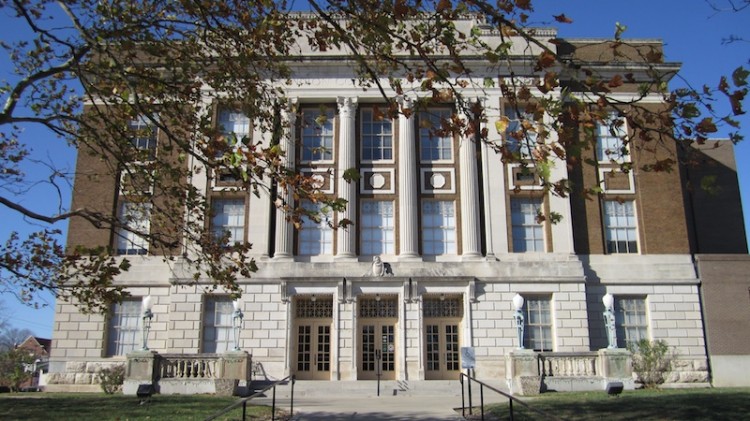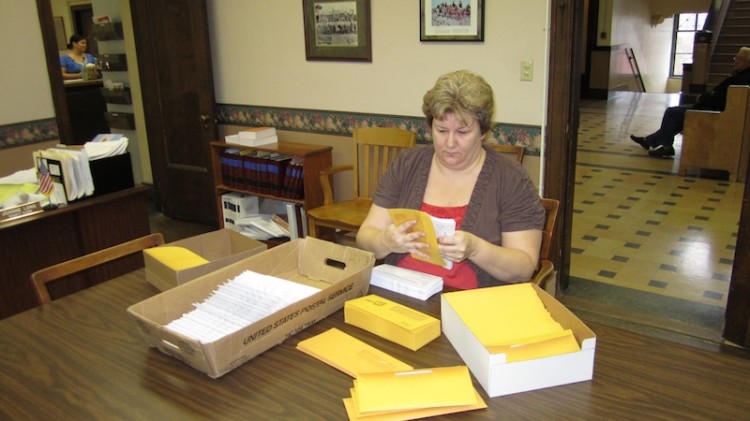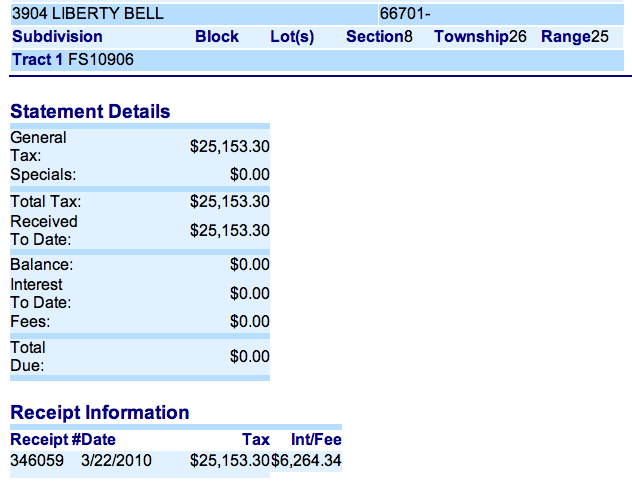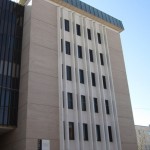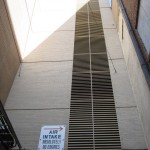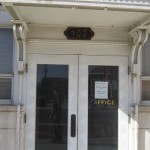Derek Schmidt, the Attorney General for Kansas, met with around 30 to 35 locals in the lobby of Citizen’s National Bank this afternoon. He is trying to visit all the counties in Kansas. He mentioned that they hired a police officer from the City of Fort Scott to do criminal investigations and she has been doing an excellent job.
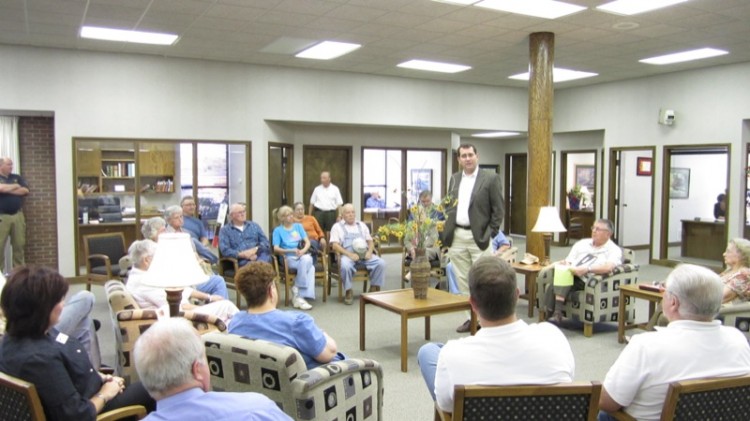
Mr. Schmidt is from Independence and has a wife and two girls ages 6 and 8. He is very glad to be done with campaigning so he can focus on his job and not spending so much time away from his family.
Consumer Protection
Most of the cases the Attorney General’s office gets involved with are at the request of local government. The one area where the AG’s office does get involved is in consumer protection cases.
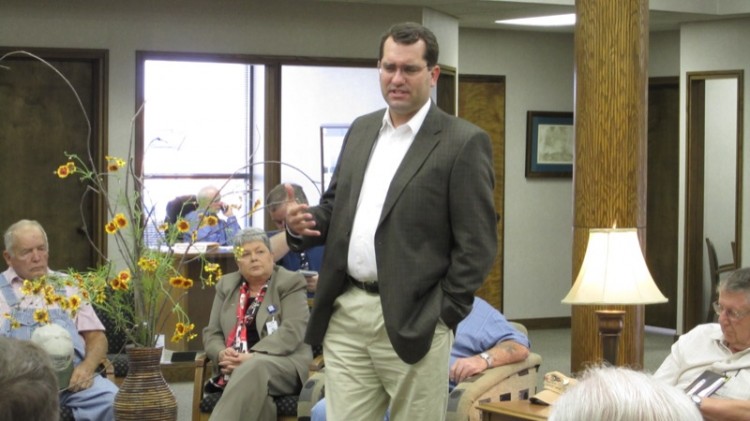
Mr Schmidt said that they pursue 7,000 to 8,000 consumer protection cases per year. They recently recovered $1.2 million dollars for Kansans from a pharmaceutical company. They try to weigh which cases to pursue based on protecting customers, not on the amount that can be recovered.
The Attorney General said that one of the recent scams they have seen happening is done over the phone when someone gets a call purported to be from their grandchild who lives far away. The person on the phone claims to be traveling and says they were mugged and need a couple hundred dollars wired to them to get back home. The person making the call isn’t the grandchild and is just someone who has researched enough information about the kid online in order to sound plausible on the phone.
He also cautioned against telemarketing calls raising money fro charitable organizations. While they often are legal, many times the telemarketer gets 85% of the donations and the charity only gets 15%.
Bourbon County Treasurer Investigation
Melvin Antrim said that many people in the county are paying more than they should in taxes because the Treasurer is “giving a good deal to some of her friends.” He felt the laws on the books didn’t cover accounting and pointed out that when people don’t pay their share of the taxes, the mill levy goes up, but pretty much never comes back down. Mr. Antrim also mentioned that the interest on late taxes should be distributed to the city as well as the county because they are suffering from uncollected taxes as well.
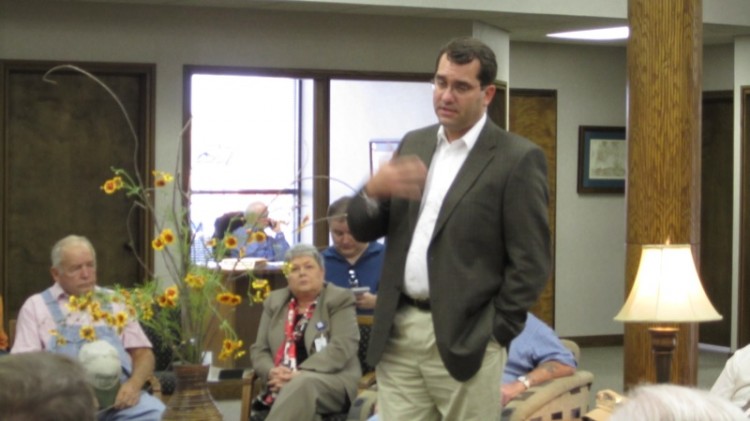
Susan Porter asked if she could present to the Attorney General or KBI before a final decision was made regarding whether or not to pursue an investigation against the Bourbon County Treasurer.
Mr. Schmidt said that he can’t confirm whether they are investigating or not and would only confirm that he was aware of the local news coverage.
As far as general procedure, he said that they do get asked to look at local cases. This year his office has sent a police chief to prison and convicted the Treasurer of another county of theft. He said that the Attorney General’s office has to look at whether a crime was committed–not whether an elected official meets the community standards for job performance. He stressed that they don’t want to second guess the voters unless they are certain criminal conduct has occurred.
An individual asked whether or not breaking a statute is breaking a law. The Attorney General explained that it is possible to break a law without being guilty of a crime and just because something is not criminal doesn’t mean it is right. He elaborated that a number of laws have no penalty attached to them and that crime is a very specific concept.
Cecelia Kramer asked what happens when they get a complaint against an elected official. Mr. Schmidt said that for them to investigate something, they would normally need to receive a request from the County Attorney.

Healthcare
Karen Endicott-Coyan asked about the healthcare law and the Attorney General’s efforts to have at least part of it overturned. Mr. Schmidt felt that it was likely that the case would be heard by the Supreme Court–possible as soon as early next year. He said that in addition to the health insurance mandate, another part of the law that he was concerned about is the way that the federal government could with hold all funding for Medicare/Medicaid programs if a state does not meet new conditions.
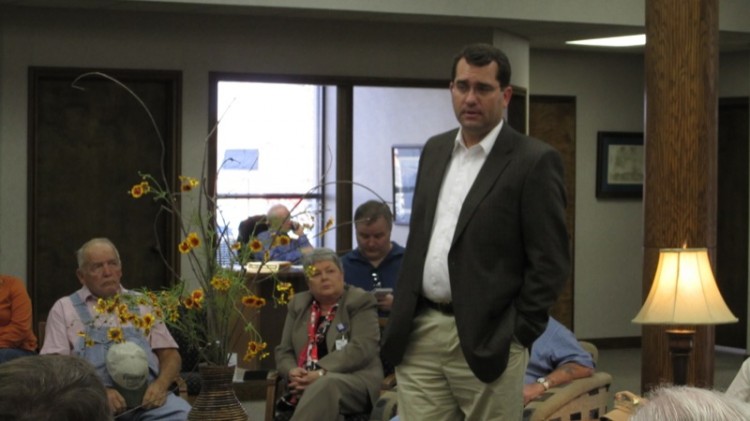
EPA
The Attorney General mentioned another case where Kansas is suing the federal government regarding EPA regulations. There are new stipulations saying that Kansas power plants are damaging cities in Michigan and Dallas and that they need to be fixed by January. The power plant operates have said that even if money was not a concern, they could not make changes on that timeline. If the regulations stand, a number of power plants will need to shut down or operate at partial capacity. Mr. Schmidt said that if other states have excess power, Kansas may be able to buy more power at higher rates. Otherwise someone would try to turn on their furnace in February and it might not have the power to operate. He said that the original report listed several other cities that were being hurt by Kansas power plants, but the Kansas scientists looked at it and said that the data didn’t support those conclusions. Rather than changing the demands, the EPA switched the report to different cities.
